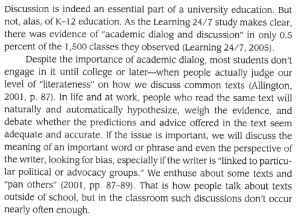The post below is by guest blogger Alex Hernandez.
***
What argument is the author trying to make?
Do you agree or disagree?
My freshman literature professor at Claremont McKenna College sat expectantly, hands folded. I was stunned. After thirteen years of K-12 schooling, it never occurred to me I could disagree with an author whose ideas were in print. I was the dream citizen for any oppressive regime trying to make things a little easier.
The two simple questions above were asked over and over again, in class after class, and were the foundation of my liberal arts education. Read a challenging text. Debate the author’s meaning. Form your own argument. Write about it. Wash. Rinse. Repeat.
College was my intellectual awakening.
I always think about my first day of freshman lit when I walk through Success Academy Charter Schools in New York and Brooke Charter Schools in Boston. [Note: my employer Charter School Growth Fund provides philanthropic support to both Success and Brooke]
The intellectual awakening at Success Academies begins at five year old. The video below (start at 0:52 if crunched for time) shows first graders debating the story The Araboolies of Liberty Street and its themes of freedom and oppression.
These first graders are wrestling with a challenging text and debating the author’s meaning, like I was asked to do in college. But if you dig deeper, you’ll see the heavy thinking in this class is shouldered by students, not adults.
I had the opportunity to attend Success Academies’ summer teacher training (T-School) in 2015. We spent the entire day making meaning of texts and preparing sets of questions to spark student discussion, just like in the video. Spoiler: it’s harder than it looks.
Brooke Charter Schools is similarly focused on helping students analyze texts and make written arguments in response to literature.Their instructional resources are shared here.
In this video (see 7:52, 11:08 and 16:39), seventh grade students analyze the writing of their peers to learn how to make an effective argument. Similar to Success, Ms. Teevens pushes the thinking load on her students as they write.
Success and Brooke’s academic programs are designed to spark the intellectual awakening that I didn’t receive until college. And they do it for low-income, students of color.
Not surprisingly, Brooke and Success students score higher on state tests than their wealthy peers who receive a less challenging education. The higher Common Core standards have helped bring more reading and writing into schools, but in his book, Results Now (2006, p. 66), Mike Schmoker reminds us how rare it is to find schools that provide such rich, academic experiences.
While Brooke and Success are recognized by many of their charter school peers for having the most sophisticated academic programs in the country, a lot of reactions are designed to discredit their work.
They cream the best students! (i.e., the kids would have succeeded anyway)
They get rid of their toughest students! (i.e., they cheat)
They spend all their time on test prep! (i.e., the schools game the system)
They only succeed on state tests! (i.e, test scores are not legitimate measures)
They can’t replicate their results (i.e., let’s just ignore these outliers)
What folks are saying (but not really saying) is that if low-income, students of color seem to be improving their educational circumstances then it must be a hoax.
But what if low-income students could receive the education I had to wait until college to receive (and pay over a hundred thousand dollars).
What if success actually existed in urban public education?
Success would look a lot like these public charter schools in Boston and New York.
***
Alex Hernandez (@thinkschools) is a partner at Charter School Growth Fund, a nonprofit that supports the growth of the nation’s best public charter schools. He serves on the boards of DSST Public Schools, Ednovate, 4.0 Schools and Rocketship Education. Alex graduated from Claremont McKenna College and has an MBA and Masters of Education from Stanford University. He lives near Boulder, CO with his wife and twin sons and can usually be found on his porch late in the evening playing Mexican folk songs.



There is one very easy way to demonstrate that these results are legitimate:
Take over a low-performing school, keep the entire student population, hire all your own teachers, design your own curriculum, and see how it goes.